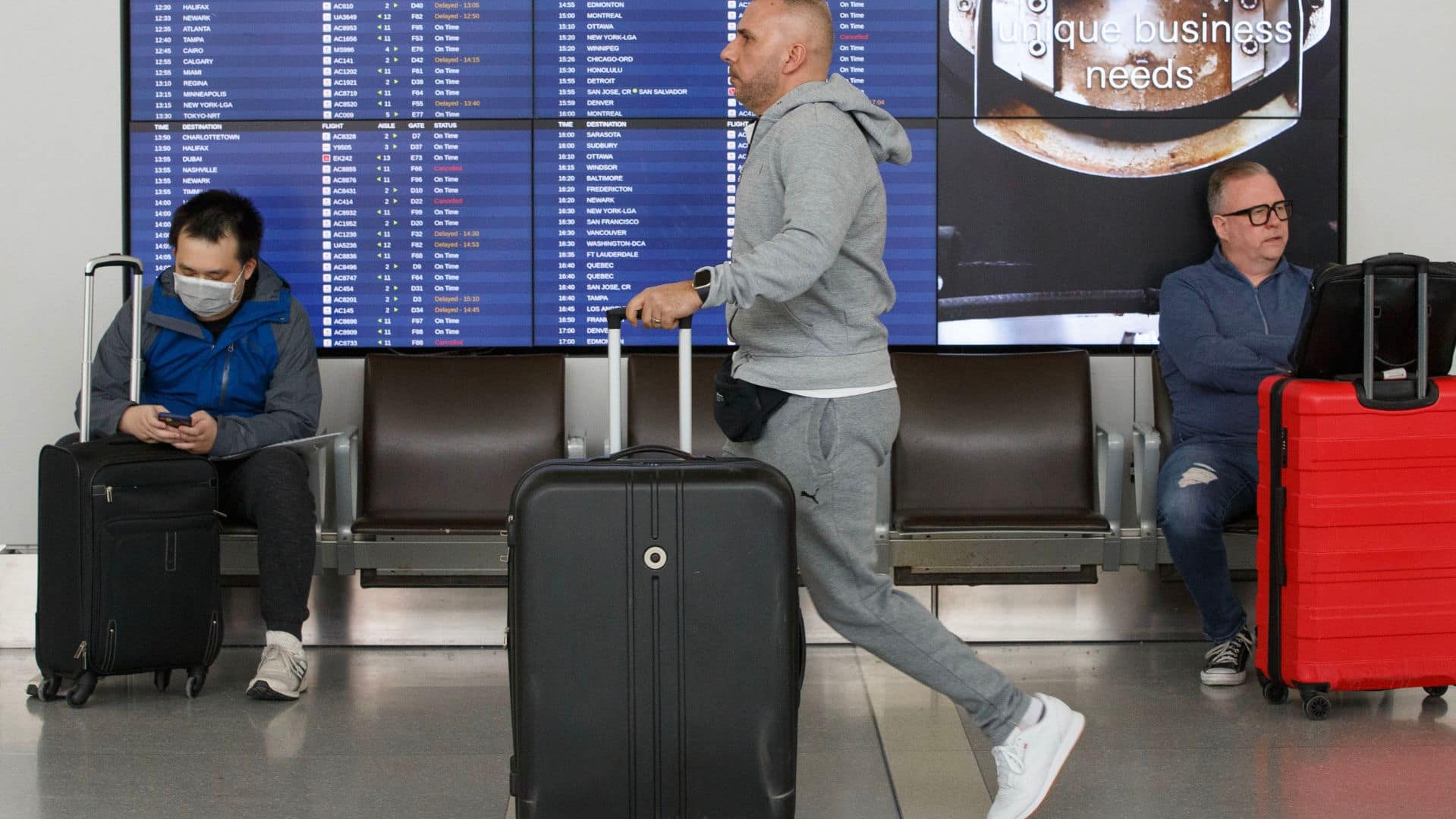Business
Air Canada profits soar amid booming demand for international travel — and ticket prices took off, too
Air Canada says it earned a profit of $838 million in its most recent quarter amid booming demand for travel and higher fares — despite thousands of flight delays.
The Montreal-based carrier posted quarterly numbers on Friday morning that showed the company’s financial results are soaring to levels not seen since before the pandemic.
Operating revenues in the three-month period up until the end of June touched $5.43 billion, up from $3.98 billion in the same period a year ago.
Net income came in at $838 million in the quarter, a reversal from the loss of $386 million in the same period a year earlier. Earnings per diluted share came in at $1.85. That’s the highest figure for that number since the middle of 2019.
Analysts also noted higher ticket prices behind the thicker profit margins. “Air Canada had a very strong quarter benefiting from strong customer demand, full planes, high ticket prices and low fuel costs,” said RBC Dominion Securities analyst Walter Spracklin in a note to investors.
CEO Michael Rousseau credited the company’s strong quarterly performance to booming demand for travel, especially international destinations. More than two thirds of the year-over-year increase in revenue came from international travel, Rousseau said, adding that the airline “safely carried over 11 million customers across our global network in the quarter, a year-over-year increase of about 23 per cent.”
Poor on-time performance
Despite the strong financial performance, Rousseau says the company knows it needs to improve.
The company’s flight communicator system broke down one day in May and then again in June, each time causing delays to ripple across the network and stranding or inconveniencing thousands of passengers.
After initially rejecting thousands of passenger claims for compensation related to the outages, the airline eventually started offering compensation to people whose claims had previously been denied.
“Despite having more trained resources than last summer and improved tools, our operations in June and July were not at expected levels,” Rousseau said. “We are increasing our efforts to protect the customer journey from disruption, regardless of the cause.”
Separate from the company’s earnings on Friday, a report this week by market research firm Cirium showed the company didn’t leave its delay problems behind it in June. Cirium ranked Air Canada in last place among the 10 biggest airlines in North America for on-time performance in July. Less than 52 per cent of the airline’s flights during the month were on time.
Westjet was in seventh place, with almost 62 per cent. The leaders were Alaska Airlines and Delta, which came in at 82 and 78 per cent, respectively.
The federal government has announced several changes to the Air Passenger Bill of Rights, including closing loopholes that let airlines cancel or delay flights without giving compensation.
Air Canada spokesman Peter Fitzpatrick told the Canadian Press that 140,000 passengers per day flew on Air Canada’s 36,000 trips last month.
“As with any system, when it is operating at full capacity it may slow processes down and take longer to recover when issues arise. That said, many of the delays were relatively short,” he said.
Data from tracking service FlightAware.com shows that on Thursday, 19 Air Canada flights were cancelled across its network, while 254 were delayed. Those represent three and 44 per cent of the airline’s entire service, respectively.
The day before, Air Canada saw 533 delays or cancellations out of roughly 1,250 flights.

Business
Amazon rejects plea to stop selling taxi roof signs as cab scam spreads across Canada
After a long day at a work event in July, Kathryn Kozody was relieved when she spotted a car with a lit-up taxi sign.
She thought it was odd when the driver told her she’d have to pay her fare with a debit card. Still, a tired Kozody hopped in the car.
“I was like, ‘Fine, it’s kind of weird, but let’s go home,'” said Kozody, who lives in Calgary.
Nothing else seemed off — until the next day when she discovered that almost $2,000 was missing from her bank account. On top of that, her debit card had someone else’s name on it.
Kozody concluded that the taxi driver was a fraudster who, during the debit card transaction, recorded her PIN, stole her card and handed her back a fake.
“I started freaking out,” she said. “It’s terrifying when they have your debit card.”
It took Kozody about two weeks to get her money back from her bank, and she’s still rattled by the experience.

“It really felt like an invasion of privacy and a violation to be a victim of this scam,” she said. “I really don’t want it to happen to anybody else.”
The taxi scam isn’t new; Toronto and Montreal have been seeing it for years. But the crime is becoming more widespread.
This summer, police in Calgary, Edmonton and at least five cities in southern Ontario, including Kingston and Ottawa, posted warnings online that they had received multiple reports of the scam.
Police and the Canadian Taxi Association say the fraudsters have a helping hand: with the click of a button, they can purchase a generic — but official looking — taxi roof sign on e-commerce sites like Amazon.

The taxi association has asked Amazon, by far Canada’s most popular online shopping site, to stop making the roof signs so easily available.
“They do have a moral responsibility to at least sell the signs to individuals that are properly licensed,” said association president Marc André Way.
However, the U.S.-based company continues to sell the product to all customers.
“These lights are legal to sell in Canada,” Amazon told CBC News in an email.
‘Eye-popping’ numbers
The taxi scam has several variations but typically ends the same way: the victim pays with a debit card, then the scammer secretly steals it and hands the victim a similar but fake card. Shortly thereafter, money disappears from the victim’s account.
Ron Hansen, deputy chief of police in Sarnia, Ont., said his department received 12 reports of the scam in July, with one victim losing $9,900.
Toronto police report that since June 2023 the department has received 919 reports of the taxi scam, totalling $1.7 million in losses.

The numbers are “eye-popping,” said Toronto police detective David Coffey.
“When they do get a victim, they are quick to go right into the bank accounts. They’re quick to empty them out.”
Jessica Chin King of Toronto said just 15 minutes after a recent cab ride, she got a suspicious activity alert from her bank. Turns out, $600 had been withdrawn from her account.
“I was like, ‘Wow, I can’t believe that just happened.’ I was in shock,” said Chin King, whose bank later reimbursed the cash.
She said she too was fooled by the taxi sign atop the car.
“I was in the car with somebody who wasn’t a taxi driver. Anything could have happened,” she said. “I was thankful that it was only my bank [account] that was compromised.”
Taxi light for $35 on Amazon
CBC News bought a taxi sign from Amazon for $35. It has a magnetic strip on the bottom, so it easily sticks to the top of a car.
To power the light, an attached wire can be run through the driver’s window and plugged into the car’s auxiliary power outlet, also known as the cigarette lighter outlet.
The taxi association says licensed taxi drivers typically get their roof signs from speciality suppliers, and they are hardwired to the car — not powered via the cigarette lighter.
“When you see that … it’s obvious that it’s not a legitimate taxi,” said Way, the association president.
Last month, Way sent Amazon a letter on behalf of the Canadian Taxi Association, asking it to stop selling the product.
“This is not a safe, practical way to distribute the trusted ‘Taxi’ signs,” he wrote.

But Amazon told Way — and CBC News — the signs will remain on its site, because the company isn’t breaking any rules.
“It’s going to be quite difficult, I think, for anyone to stop Amazon from selling a product that is perfectly legal to sell,” said Toronto criminal lawyer, Daniel Goldbloom. “It’s true that these taxi signs can be used to commit scams, but kitchen knives can be used to commit murder — and we don’t stop retailers from selling those.”
But Way isn’t giving up hope.
He says the taxi association also plans to ask other online retailers, such as Temu and eBay, to stop selling the taxi signs and will lobby provincial governments for legislation that regulates the sale of the product.
However, Coffey said he believes the best way to fight the taxi scam is to educate people about it.
“Never, never give another person control of your debit card,” the detective said.
Victims Chin King and Kozody also want to spread the word.
“The more people know, the less likely it is to happen again to somebody else,” Kozody said.

Business
The Bonding Stages


Product Name: The Bonding Stages
Click here to get The Bonding Stages at discounted price while it’s still available…
Description:
Relationship Building System
Created By Bob Grant, P.L.C.
Or – Skip To The Text Verion
Privacy Policy
Contact
Affiliates
User Agreement
1720 Mars Hill Rd Sute – 8

Click here to get The Bonding Stages at discounted price while it’s still available…
Business
You Can Minimize the Odds of Being Ghosted

When job seekers complain about being ghosted—a form of silent rejection where candidates hear nothing after submitting an application or having been interviewed—I wonder if they’re unaware of the changes in social norms and mannerisms. Do they not know that social norms and the workplace are intertwined? Since the advent of social media, manners, courtesy, and empathy have significantly diminished.
If there’s one thing job seekers can be certain about, they’ll be ghosted multiple times throughout their job search. It wouldn’t be a stretch to say ghosting candidates has become a norm. It’s worth pointing out that companies don’t ghost candidates; the company’s employees ghost candidates. When the recruiter or hiring manager is of a generation that finds ghosting an acceptable way to terminate a relationship, romantic or otherwise, it shouldn’t come as a surprise when they ghost candidates.
Bad News: You can’t change or control other people’s behaviour.
Good News: You can take proactive steps to minimize—as with all human interactions, there are no guarantees—the chances of being ghosted.
Build a strong relationship. Focus on being likeable.
Understandably, hiring managers—recruiters less so since they won’t be working with the candidate—look to hire candidates they can envision getting along with; hence, most job seekers would significantly boost their chance of job search success by focusing more on being likable.
By likable, I mean being pleasant, respectful, and expressing genuine interest in the company and the role. I’ve yet to meet a hiring manager who hires candidates they don’t like. As I’ve mentioned in previous columns, likeability supersedes your skills and experience. Most job seekers don’t focus enough on being likeable.
The stronger the relationship (read: bond) you establish with the recruiter or hiring manager, the more likely they won’t ghost you. From your first interaction, focus on creating a rapport beyond just transactional communication.
Personalizing your correspondence can make a significant difference. Use the hiring manager’s name instead of a generic ‘To Whom It May Concern.’ Find commonalities such as place of birth, hobbies, schools attended, associations you belong to, favourite restaurants, and people you know.
Avoid appearing confrontational.
Anyone reading this can relate to the number one reason why people ghost: to avoid confrontation. Today, many people feel entitled, resulting in job seekers being frustrated and angry. You only need to scroll through LinkedIn posts and comments to see that bashing employers has become an unproductive trend. Hence, it’s likely that a candidate will become confrontational if told they don’t get the job.
Smile throughout your interview! Avoid appearing desperate! My best interviews have been those in which I was nonchalant; I was indifferent to whether or not I got the job. In addition to being a turn-off, showing signs of desperation will raise questions about how you’ll react if told you don’t get hired.
Lastly, tell your interviewer how much you enjoyed talking with them and that you look forward to hearing back.
- “I really enjoyed our conversation, Khloe. Thank you for taking the time to meet with me. I look forward to hearing your hiring decision.”
- “Either way, please call or email me to let me know about my application status.”
You’re more likely to receive a response by asking explicitly for communication.
Earn your interviewer’s respect.
People tend not to ghost someone they respect.
Respect must be earned, starting with one of life’s golden rules: Treat others how you want to be treated. In other words, give respect to get respect.
Throughout your job search, be professional and courteous. Respond promptly to emails and calls and thank people for their time. Approaching recruiters and hiring managers politely and professionally improves your chances of being treated similarly.
Ask for advice, not feedback.
Asking for advice encourages communication. As your interviewer is wrapping up the interview, mention that you’d welcome their advice. “Given your extensive background in project management, any advice you may have for me wanting to advance my career would be greatly appreciated.”
Why ask for advice and not feedback? The first problem with asking for feedback is it puts the other person on the spot. The second problem is feedback can lead to disagreement, hurt feelings, or defensiveness, a common reaction resulting in confrontation. On the other hand, asking for advice is asking for guidance and suggestions to achieve a better result. Essentially, you’re acknowledging the other person’s experience and massaging their ego. Do you know anyone who doesn’t like being asked for advice?
Send a thank you note.
Sending a thank you note expressing appreciation for the interview and the insights you gained reinforces your interest and keeps the lines of communication open. Conclude with a forward-looking statement, encouraging the recipient to respond.
- “I look forward to hearing from you regarding the next steps.”
- “I look forward to staying in touch.”
Job searching aside, direct, open, and honest communication—say what you mean, mean what you say—which I highly value, has become rare, which explains the prevalence of ghosting. When you’re ghosted, assume the company isn’t enthusiastic about hiring you. Silence may be golden in some things, but ghosting is not one of them.
_____________________________________________________________________
Nick Kossovan, a well-seasoned veteran of the corporate landscape, offers “unsweetened” job search advice. You can send Nick your questions to artoffindingwork@gmail.com.
-
Health23 hours ago
Zeneara
-
Business16 hours ago
Amazon rejects plea to stop selling taxi roof signs as cab scam spreads across Canada
-

 News15 hours ago
News15 hours agoCanadaNewsMedia news September 10, 2024: Former BoC governor will address Liberal caucus, NDP caucus begins
-
News21 hours ago
The Doctors We Need: Imagining a New Path for Physician Recruitment, Training & Support By Dr. Anthony Sanfilippo
-

 Tech10 hours ago
Tech10 hours agoIntroducing the PlayStation 5 Pro: The Next Evolution in Gaming
-

 News11 hours ago
News11 hours agoThe Use of Humanitarian Aid in a Conflict Zone
-
Health21 hours ago
Paleo Diet Secrets Revelated
-

 News13 hours ago
News13 hours agoBusiness lobby group warns Ottawa digital services tax could ‘imperil’ trade talks















